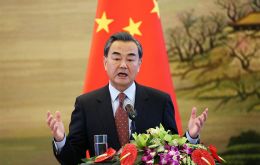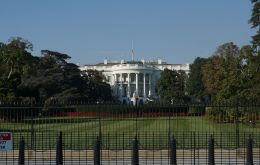MercoPress. South Atlantic News Agency
Tag: China
-
Tuesday, November 5th 2019 - 09:36 UTC
Xi calls on the world “to tear down the walls” of protectionism and unilateralism

President Xi Jinping on Tuesday pledged to further open China's economy, declaring the world must “tear down walls” as he opened an annual trade fair in Shanghai.
-
Thursday, October 31st 2019 - 08:42 UTC
African swine fever will spread further and no country is immune, OIE

African swine fever will spread further across Asia where it has devastated herds, and no country is immune from being hit by the deadly animal virus, the head of the World Organization for Animal Health (OIE) said on Wednesday.
-
Friday, October 25th 2019 - 08:34 UTC
China says UK and Europe responsible for the 39 deaths in the refrigerated lorry

Britain and other European countries must accept some responsibility for the deaths of 39 people, believed to be Chinese nationals, found dead in a refrigerated truck near London, the state-backed Global Times said on Friday.
-
Wednesday, October 23rd 2019 - 09:50 UTC
China attacks Western hypocrisy equaling Hong Kong with Chile and Catalonia situations

China is seizing on violent protests in Europe and South America to bolster its condemnation of demonstrations in Hong Kong and defend its handling of the unrest.
-
Tuesday, October 22nd 2019 - 12:12 UTC
How has the US-China trade war affected forex?

There are many factors that affect the value of currencies and influence the flow of foreign exchange, but few have a more significant impact than a trade war.
-
Tuesday, October 22nd 2019 - 09:45 UTC
Venezuelan opposition leader holding “exploratory” talks with Russia and China

Venezuela's opposition leader Juan Guaido has asked China and Russia to help end a political crisis crippling the Latin American country during “exploratory” talks, his diplomatic representative in Brazil said on Monday.
-
Tuesday, October 22nd 2019 - 09:30 UTC
Trump optimistic a partial trade deal with China will be signed next month

US President Donald Trump on Monday said progress in developing the text of a partial trade pact with China means he will likely be able to sign it next month. Trump remains upbeat on the chances Beijing and Washington will seal the mini-deal he announced earlier this month - marking a cooling-off period in the two nations' damaging trade war.
-
Monday, October 21st 2019 - 09:11 UTC
Resolving the “Taiwan question” is China's greatest national interest

The Chinese defense minister said on Monday that resolving the “Taiwan question” is China's greatest national interest and that no force can prevent China's “reunification”.
-
Monday, October 21st 2019 - 05:53 UTC
Yuan at appropriate level says China, furious with IMF over quotas adjustments

China's top central banker said on Saturday that potential escalation of trade tensions and policy uncertainty were the major risk factors facing the world economy, and market forces were keeping China's Yuan at an appropriate level.
-
Friday, October 18th 2019 - 10:25 UTC
China's economy grows at its slowest rate in three decades in the third quarter

China's economy expanded at its slowest rate in nearly three decades in the third quarter, hit by cooling domestic demand and a protracted US trade war, official data showed on Friday.
